Guardians of the Trees
Air Date: Week of November 5, 2021
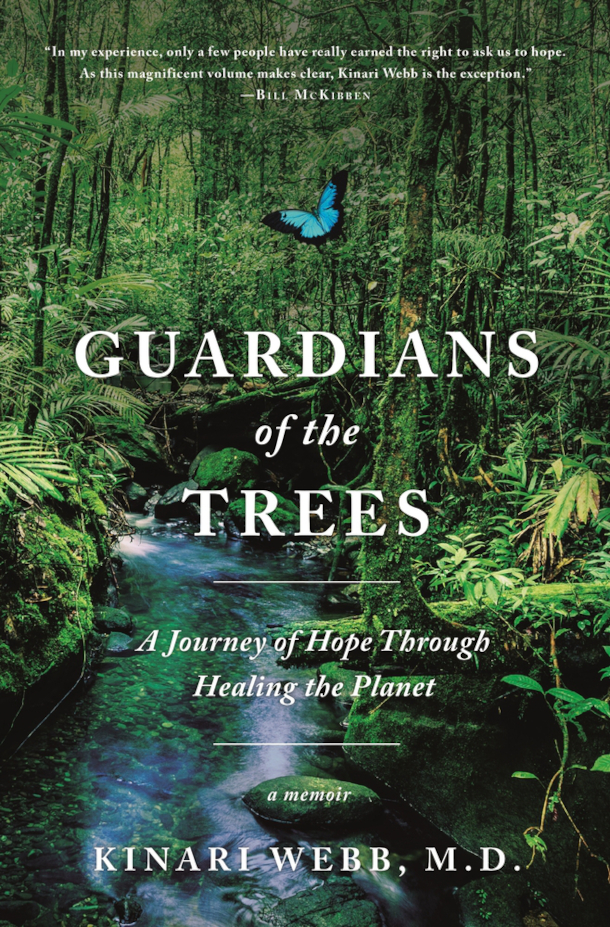
“Guardians of the Trees: A Journey of Hope Through Healing the Planet: A Memoir” reflects on the connections between human health and planetary health through the eyes of physician Kinari Webb as she treats patients in the rainforests of Indonesian Borneo. (Photo: Courtesy of Flatiron Books)
Indonesian Borneo is home to Gunung Palung National Park, which hosts diverse species found nowhere else and is beloved by the people who live on the island. But like many people who live near tropical forests, they have at times had to resort to illegal logging to pay for healthcare. To combat this, physician Kinari Webb founded the nonprofit Health in Harmony, which aims to keep the forest healthy by keeping people healthy. Dr. Webb writes about this in her memoir Guardians of the Trees: A Journey of Hope Through Healing the Planet, which she spoke about with Hosts Steve Curwood and Bobby Bascomb at a Living on Earth Book Club event.
Transcript
CURWOOD: It’s Living on Earth, I’m Steve Curwood.
BASCOMB: And I’m Bobby Bascomb.
Gunung Palung National Park in Indonesian Borneo is home to hundreds of endemic species found nowhere else on earth; think orangutans, white bearded gibbons, and proboscis monkeys to name a few. And the rainforests of Borneo are vitally important both as a habitat and a sink to absorb and store climate warming carbon dioxide.
Much of the soil in Borneo is peat bogs, one of the most carbon dense ecosystems on earth. Largely because of deforestation Indonesia often ranks in the top 10 for greenhouse gas emitting countries.
CURWOOD: Kinari Webb is a physician who first saw the deforestation in Indonesia when she was still a college student. Deeply troubled she asked the local people what they needed to stop cutting the trees. And when they told her they needed medical care Kinari changed her life. She came home to the US, eventually went to medical school and completed a family practice residency before heading back to the rainforest to listen again to the people there to learn how she could best provide high quality health services. Her memoir, Guardians of the Trees: A Journey of Hope Through Healing the Planet explores her challenges and successes in Borneo. Doctor Webb recently joined Bobby and me for a Living on Earth Book Club live event at the Harvard TH Chan School of Public Health to tell her story.
WEBB: So when I first went to Borneo to study orangutans, I was just so angry at the local community members who were cutting down these giant rainforest trees, which might even be 1000 years old. And I just thought, how can they do this? Don't they know that the forest is also important for their own future wellbeing, and not just the future wellbeing of the whole planet? But then I got to know many of them and it just broke my heart when I realized what they told me was going on is that they were often forced to log to pay for health care. And that just shouldn't be. And why do these communities have so few resources? Because of many 100 years of colonialism, right? So what I like try to explain to people here in the US often, is your wellbeing is actually dependent on the wellbeing of people living around rainforests. And when they're also forced to invade into forest, you have a higher chance of spillover for pandemics. You know, this is not the only problem for loss. Of course, of course, we also have companies cutting down large amounts of forests. But this problem of local communities wanting to protect the forest and not able to, is a serious problem in many, many places. And it's often access to health care. Right? One woman told me if anyone tells you that they have not logged to pay for health care, they are lying to you, because that is the only way to get enough money for a medical emergency, which can cost an entire year's income.
CURWOOD: So I take it this is your inspiration for starting the group Health In Harmony.
WEBB: Yeah.
CURWOOD: And you say at one point this is a divine calling, this work.
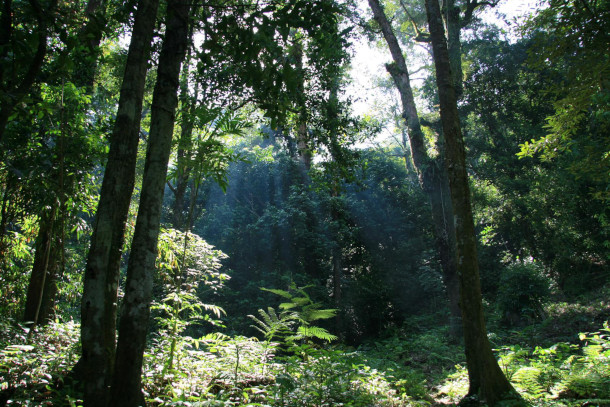
Gunung Palung National Park is the unfortunate target of illegal logging, often by locals who resort such measures to pay for healthcare costs. (Photo: Tom, Wikimedia Commons, CC BY-SA 2.0)
WEBB: Yeah, it is. It is, I'll tell you, this book is also a divine calling. And if I didn't have to do it, I wouldn't, I would much rather not have released this book. But we don't have time. And this is the great period of time, in probably all of human history. We either make this enormous change, where we recognize that we are all interrelated and that we will not survive without each other. And when I use the word all, I mean it in the way that many indigenous communities use it. Whereas our cousins, the trees and the animals, right? We are all interrelated. And we can't survive without our lungs and our heart. And it's like, we can't survive. And we can't survive if some people are suffering, because of a long history of colonialism, resources need to flow back. And these communities know what the solutions are. They know how to solve the problems, how to address the critical, I call them fulcrums of change. These areas where if you change those few things, and I think they're completely invisible to outsiders, but local communities can say if these things change, everything else will change.
BASCOMB; Well, that's certainly true. Can you tell our listeners some of the details of how it works? How do you provide health care to people in exchange for not logging? What were some of the details that you've worked out with them? Or really that they suggested to you?
WEBB: Yeah, so some of the cool things are, they wanted affordable, high quality health care, Okay, so affordable, how do we make it affordable? Well, we could just provide it for free. But then they said if they was free, they wouldn't value it as much. But we want everyone who can, no matter how poor they are to be able to pay for it. So the way that we did it was everyone can pay with non cash payment options, and you can pay with seedlings. And if a given community is not logging at all, they get a greater thanks from the world community. So they get a 70% discount on their health care costs. So they have to pay with fewer seedlings. If their community is logging, they have to pay with a little bit more seedlings. But they love this because they see this direct connection. And it helps them encourage the few folks who are continuing to log to stop. And then they asked for alternative livelihoods in organic farming training. So that's also, you can also in our clinic pay for your health care with manure, we use that manure for the for the organic farming training. So there's always this, you can see very clearly how the health of the natural ecosystem and the health of the economic system is fully related to the health of people. Which is true, right? That's just true. And it tends to be the way that rainforest communities see it, right, this everything is interconnected. But in the West, we tend to be very siloed. We think healthcare is somehow separate from the environment and somehow separate from economic well being. But of course it isn't.
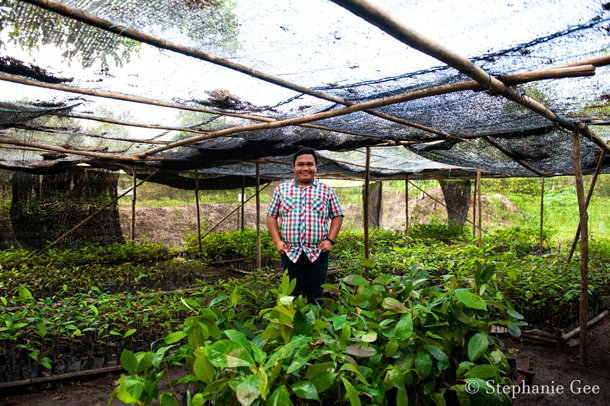
Health in Harmony is part of the nonprofit ASRI founded by Dr. Webb which also has a location on Java Island in Indonesia. Here, ASRI’s Director of Conservation Programs, Dika, stands in a seedling nursery. (Photo: Stephanie Gee)
BASCOMB: That's really profound. And I think you really do have such a wonderful model here for other countries and other communities to emulate. Can you talk about, you know, maybe the personal story of one of the people that came into your clinic that you were able to help? I'm thinking of a patient named Dardi. Can you tell his story for us?
WEBB: Sometimes I think about his story as a metaphor for where we all are on the planet. Dardi, his mother found us at an eyeglass distribution center, when we were giving out eyeglasses one day, and she must have run long distance to come and find us. And she's "please, please come see my son". So we went to go see her son, she has a tiny little house very, very small. And within that space, she had created this sort of even tinier little room that was completely dark. And he had been in that dark room for eight years, suffering in horrible, excruciating pain in his head. He was also incontinent, although his mother kept him exquisitely clean. And he couldn't tolerate any noise, he couldn't tolerate any light. And it turned out that he had tuberculosis of his brain. And probably had like a tuberculoma, which is a kind of a massive tuberculosis in his brain. So he was in just terrible distress, suffering extremely. She had spent every bit of money they possibly had on care and had not been able to figure out what was wrong with him. We were able to correctly diagnose him and start him on treatment. He was, in fact, our first inpatient at the clinic when we started. And that was like, it was kind of a, this totally miraculous thing. We had to like, bring him at night, and like, you know, put all shades, nearly carry him into the clinic. And then we were able to give him antibiotics, that tuberculosis medicines and also some steroids to kind of prevent any, as all the TB bacteria are dying, they can create a lot of inflammation. So we were able to treat him. Within two days, he is like, like walking, he can tolerate light. I mean, it was, just the improvement was just unbelievably dramatic. And his mother paid with non-cash payments, she went paid with these beautiful handicrafts that she had made. But the thing about TB medicines, you have to take them for a very long time. Because even though you have this dramatic improvement right away, you really have to take your medicines. So that was a whole nother process. But then, even though he eventually was better, physically, he was terrified. He was terrified to go outside, after being in the dark for so long. You know, it makes sense that you would just be scared, right? It's a totally new thing out there. And so then we had to have a psychiatrist come and work with our Indonesian docs to teach them how to help him, slowly learn how to be in the world. And that did work. And then one day, he actually asked Dr. Made, who was the doctor is taking care of him, can I go to the beach. And for me, that is kind of like, that's where we are on this planet, right? We have been in the dark for a very long time. We are just beginning to see our interconnections. We are just beginning to see what a massive crisis climate change is. But now we're scared. Even though the truth, the healing knowledge of truth is basically here from almost all of us. We don't know what to do. We don't know how to be in the world. And there is that personal healing and that community healing that leads to the planetary healing. And eventually Dardi actually got a job and he was able to support his family. And, you know, he had this integrated health in all ways, with a healthy sustainable livelihood, and a sustainable family, and he could have access to continued care. That's what we need to do on our planet. We need to do the personal healing, and the community healing and the global healing. And we need to listen to those who have suffered the most about what the solutions are.
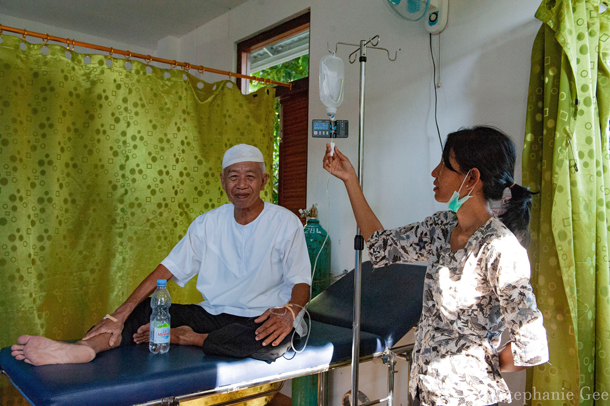
A patient is treated at the ASRI medical clinic. (Photo: Stephanie Gee)
BASCOMB: It seems a tall order, but you've really given us a path forward, I think, with this book and the beautiful stories within it.
WEBB: We're also working on a platform to really help people connect around the world, where people can see the solutions of rainforest communities and then be able to partner with them. And yeah, bring about this great healing.
BASCOMB: Before you really got going with your clinic and the reforestation efforts there, you engaged in something you called radical listening. You know, the notion that you want the members of the community, you want to go and ask them what they need and then listen to them. And that was sort of a radical approach to this type of work. Can you tell us a little bit about why is that a radical notion? Why isn't that done more often?
WEBB: Yeah, well, you wouldn't think it'd be radical, right? I mean, I always kind of joke like, like, the really radical thing is that we don't only listen to communities about the solutions are, we actually do it, right? Because lots of organizations say they listen, or they get input about what their idea is. That's, that's a common way of doing it as well, which from my perspective, is not radical listening. Radical listening is to let go of your own control of what the answer is. To say, I trust you, I trust the local knowledge that you know what the best solutions are. And then I will absolutely bring resources from the global north, and exactly execute your solutions. It's radical also, because it is a reversal of the colonial flow of resources. And it's not just like one and done. It's a constant process of like working with the communities. Okay. So how's this going? Now, do we want adjusted in any way? And how that's going? And what is, and it's not just like the biggest part of the solutions, but every detail of the solutions as well.
CURWOOD: So I want to follow up with a question because, I mean, you've had such remarkable results in Borneo. And the question is, how might these be replicated in other forest communities, the Amazon or the Congo and wanted to know, particularly about your experience in the Brazilian part of the Amazon, especially during this pandemic?
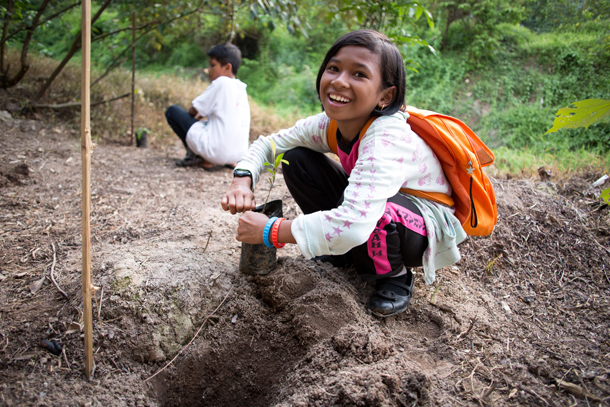
A young girl plants a seedling at the ASRI clinic in Gunung Palung National Park in Indonesian Borneo. (Photo: Chelsea Call)
WEBB: Yeah. So we have known we needed to move really fast. And we knew we had a model which looked like it was working in Borneo. It was very, Stanford did an evaluation, it looked very, very successful. The data is excellent. But we wanted to see if it would work in ecosystems that were very different. So we started working in Madagascar. Actually, Emerson, who's our fabulous program director, she says, if we can be successful in Madagascar, we were very successful anywhere in the world, because there are so many stressors, and it's very, very difficult to work there. But we have so far been wildly successful. And again, with radical listening, the communities are identifying healthcare, alternative livelihoods and education access as the key factors. And again, in Madagascar, the threat to the forest is primarily individuals who want to protect the forest, but just don't have a choice. And see that they are making a choice between their short term well being and their long term well being. But what are you going to do, right? I mean, if I had to cut down trees to pay for a C section, I would do it, right? Of course I would. It's a little different in the Amazon, what you have are rainforest communities, indigenous communities, other traditional communities, like descendants of rubber tappers, who are living in the forest and protecting it and protecting it from invaders. But when they get sick, and die, or when they have to leave to access services, they leave forest vulnerable to be invaded by outsiders, to be cut down. And occasionally they will make deals. There's one man we know of who had worked his entire life to protect the forest. And then his son got really sick and was going to need long term care. And he made a deal with a logging company who came in, right and they paid him enough that it would be, he would be able to take care of his son, and how can you blame him? And yet, I don't want anyone to ever have to make that decision. So we did radical listening again with these rainforest communities and asked them what they would need. What are the solutions that they see for protecting the forest? What do they need, we call it a thank you from the world community, so that they can protect this forest? And again, they needed access to health care, particularly during the pandemic. They needed the ability to be evacuated, if they were very sick. They needed vaccines. So we've been doing vaccine trips up, and they needed health care trips, like three or four times a year. And we've been doing that as well.
CURWOOD: How do you bring what you've learned with radical listening home to America? Because we have a society where instead of cutting down trees, people are burning or extracting fossil fuels, investing their retirement accounts in fossil fuels. So, how do you bring this concept of radical listening back to an America that is so broken right now seems like we don't listen to each other. We have nurses picketing hospitals protesting a vaccine mandate. I mean, man, it seems to me the folks in the rainforest are in a much better shape than we are right now.
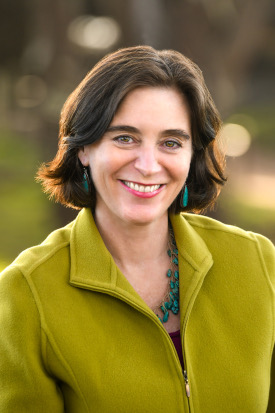
Kinari Webb MD is the founder of nonprofit Health in Harmony and the author of Guardians of the Trees: A Journey of Hope Through Healing the Planet: A Memoir. (Photo: Courtesy of Flatiron Books)
WEBB: Well, I think actually, many of the issues are very similar. First of all, there are social justice issues. Right? There's intersectional environmentalism, which is to say, where are the worst polluting industries? In communities of color, right? What are the solutions? Those who are closest to the problems are going to know the solutions the best. And I believe that should be on a neighborhood basis, which is to say every neighborhood is going to know what the solutions are for their neighborhood. And the way we do radical listening is people sit in a circle, everyone would know, what would you need as a thank you from the world community so that you could actually reduce your fossil fuel emissions? Right? I highly suspect that access to health care is actually one of those key fulcrums of change also, in this country. That if we had universal health care, I know many people would change their jobs, would choose livelihoods that were actually about thriving, right, thriving personally and thriving globally. But they often don't feel like they can even leave the jobs that they have because of access to health care. I don't know what the solutions would be. But I know who to ask. Right? And I know that communities could come up with solutions. And even imagine if we got discounts on our health care premiums, if we were emitting, you know, less fossil fuels, right, like, they should be connected, they are connected. So why not directly connect them? I bet it would work wonders.
CURWOOD: Dr. Kinari Webb is the founder of Health In Harmony and the author of Guardians of the Trees: A Journey of Hope Through Healing the Planet. And just say, Kinari, thanks so much for for joining us.
BASCOMB: Thank you so much, and best of luck in the rest of the work that you're doing there.
WEBB: Thank you so much. It's such an honor.
Links
Learn more about Kinari’s nonprofit, Health in Harmony
More about “Guardians of the Trees” on the MacMillan website
Watch the full recording of this Living on Earth Book Club live event
Living on Earth wants to hear from you!
Living on Earth
62 Calef Highway, Suite 212
Lee, NH 03861
Telephone: 617-287-4121
E-mail: comments@loe.org
Newsletter [Click here]
Donate to Living on Earth!
Living on Earth is an independent media program and relies entirely on contributions from listeners and institutions supporting public service. Please donate now to preserve an independent environmental voice.
NewsletterLiving on Earth offers a weekly delivery of the show's rundown to your mailbox. Sign up for our newsletter today!
 Sailors For The Sea: Be the change you want to sea.
Sailors For The Sea: Be the change you want to sea.
 The Grantham Foundation for the Protection of the Environment: Committed to protecting and improving the health of the global environment.
The Grantham Foundation for the Protection of the Environment: Committed to protecting and improving the health of the global environment.
 Contribute to Living on Earth and receive, as our gift to you, an archival print of one of Mark Seth Lender's extraordinary wildlife photographs. Follow the link to see Mark's current collection of photographs.
Contribute to Living on Earth and receive, as our gift to you, an archival print of one of Mark Seth Lender's extraordinary wildlife photographs. Follow the link to see Mark's current collection of photographs.
 Buy a signed copy of Mark Seth Lender's book Smeagull the Seagull & support Living on Earth
Buy a signed copy of Mark Seth Lender's book Smeagull the Seagull & support Living on Earth

